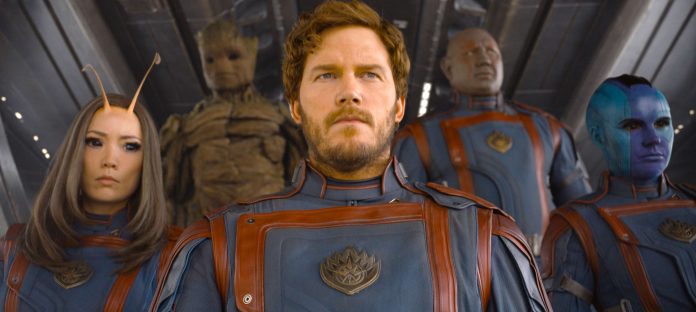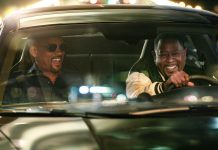
By JAKE COYLE
AP Film Writer
When Peter “Star-Lord” Quill, while inspecting a murky extraterrestrial region, pressed play on Redbone’s “Come and Get Your Love” in the first “Guardians of the Galaxy,” it would have been hard to imagine that James Gunn’s space opera would ultimately lead to something as sincere, poignant and kinda cornball as the trilogy-ending “Guardians of the Galaxy Vol. 3.”
But as Gunn has showed over over the course of these increasingly soupy sci-fi spectacles, the genetically spliced DNA of his chaotic, cartoonish cosmic vision is a double helix of opposites. Breezy ’70s rock papers over extreme violence. Cynical exteriors cloak sentimental emotions. A ragtag group of outcasts, more so than even the cast of “Fast and the Furious,” talk a lot about “family” and “friends.” Against the odds, “Come and get your love” has turned out to be a legit invitation.
“Vol. 3” is a messy, overstuffed finale. But you rarely question whether Gunn’s heart is in it. Sometimes it spoils some of that effect by trying too hard to juxtapose tonal extremes, and show off its brash juggling act. Yet whatever this sweet, surreal sci-fi shamble is that Gunn has created, everyone here seems to believe ardently in it. And for even a movie that sends a golden-hued Will Poulter shooting through space to the tune of Heart’s “Crazy on You,” that earnest belief goes a long way.
The song, though, that kicks off “Guardians of the Galaxy Vol. 3” is not an upbeat one. Radiohead’s “Creep” casts a sour mood over the Guardians, who we find in a lethargic state of disarray in the spaceport Knowhere following their 2017 “Empire Strikes Back”-esque second chapter.
Whether “Guardians of the Galaxy” is best suited to strike these solemn notes, or reach for such last-chapter poignancy in “Vol. 3” is debatable. I’ve always liked these films at their most cartoonish. Donning a degree of self-importance is probably the most Marvel thing about this “Guardians.” Gunn’s films — which, unlike most of the comic-book studio’s releases, are both written and directed by him — have always stood out for their distinct lack of Marvel house style. “Guardians 3,” unfortunately, has contracted a touch of “Endgame” grandiosity.
The group — including Star-Lord (Chris Pratt), Drax the Destroyer (Dave Bautista), Nebula (Karen Gillan) and Groot (voiced by Vin Diesel) — is quickly sent into emergency mode. Adam Warlock (Poulter), an artificial being created by the High Priestess Ayesha (Elizabeth Debicki), comes careening into their lair, leaving Rocket (voiced by Bradley Cooper and played in motion capture by Sean Gunn) on his deathbed. To save Rocket, a cybernetically enhanced raccoon, the Guardians must hurriedly resuscitate him with his original programming.
This means traveling to the lab he was created in years before by the High Evolutionary (a sensational Chukwudi Iwuji, an all-time Marvel villain), a Doctor Moreau sort who’s been toiling to craft a “perfect” race of hybrid creatures to populate a copy of planet Earth. As the Guardians seek to infiltrate his realm, “Vol. 3” repeatedly flashes back to Rocket’s experience with the High Evolutionary: his transformation from raccoon, his joyful experience with other experimental creations and his harrowing escape.
It’s telling that in this “Guardians” swan song that Gunn centers Rocket and less so Quill, whose father-son drama dominated “Vol. 2.” (Here, he’s mostly in save-my-friend mode when not wrestling with the heartbreak of this version of Zoe Saldaña’s Gamora. Thanks to some “Avengers” events, she no longer even knows him.)
These are foremost epics of orphandom about distinctly un-superhuman characters. Mother and father figures float in and out, while the Guardians attract one forlorn figure after another. In “Vol. 3,” it’s both comical and even a little stirring just how far empathy reaches for all of God’s — and Marvel’s — creatures. Gunn has taken a woebegone B-team or C-team of comic book oddballs and cast them into a cosmic tapestry of weirdos and misfits, ranging wildly in size, shape, color and dancing ability.
In “Vol. 3,” Gunn really lets the freak flag fly, putting the Guardians in battle with not just the High Evolutionary but the notion of perfection. It’s not a coincidence that this “Guardians” film arrives, finally, in the suburbs — or at least some slightly warped version of it.
Gunn, a B-movie director at heart, fills these films with more sinewy than sleek worlds, full of florid beauty and opulent grotesquerie. (“Vol. 3,” more than the last two films, reminded me of “The Fifth Element,” a good thing.) It’s often clear that his ambitions are sometimes just a bit too much; this, like his DC film “The Suicide Squad,” “Vol. 3” could have used a firmer editor to corral some of Gunn’s impulse for excess.
This installment, of course, nearly didn’t happen after Gunn’s firing years ago. And partially because of that forced hiatus, he’s now ruling an even larger, more mainstream superhero cosmos at DC. That surely has something to do with the sense of parting that permeates the final act of “Guardians 3.” After so many speeches about friendship and togetherness, “Vol. 3” ends curiously elegiacally, and with one last dance.



















